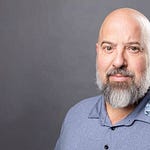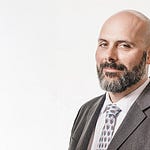“We’re so lucky to have safe, running water and a secure grid. I didn’t realize how much we take that for granted until I lived without it.”
That’s exactly what Michelle Nicholson is working to prevent, bringing the lessons she learned running a military broadcast station in blackout-prone Baghdad to the front lines of America’s energy future.
Michelle didn’t just serve overseas. She helped manage comms for visiting generals and world leaders. She saw what a failed grid looks like up close.
And she never forgot it.
Now at Solas Energy, she helps clean energy companies navigate local sentiment, permitting risk, and the evolving politics of land use. It’s a job that puts her face-to-face with rural skepticism and gives her a platform to speak up when policies like Senate Bill 819 threaten local control.
‘We’ve heard from landowners in counties with no new industry since the early 1900s. Solar and wind have brought them schools, roads, and jobs — and now they’re being told it has to stop.’
This isn’t just about clean energy. It’s about energy security, freedom, and the right to decide what gets built on your own land.
In this episode of the Project Vanguard Podcast, we dive into:
Life in Baghdad during blackouts, brownouts, and Thanksgiving food poisoning
Why power outages in Texas brought back those same feelings
What Senate Bill 819 really means for rural landowners
How energy diversity keeps farms in families
Why veterans, especially women vets, are quietly becoming industry leaders
The real-world link between clean energy, property rights, and national security
It’s part memoir, part masterclass on infrastructure politics, and 100% mission-driven.
Seen It Before? Not Like This
We get into Senate Bill 819, what it really means for landowners, and why rural voices are being drowned out by urban retirees.
We make the case for energy diversity, not energy ideology. And she does it from a place of lived experience, both in warzones and at home.
‘We would never tolerate these restrictions on oil and gas and for good reason. Why are we doing it for renewables?’
We break down the hidden cost of opposition movements and how anti-renewable sentiment is being spread across the country.
‘There’s a guy out there like Johnny Appleseed with a PowerPoint. Teaching people how to oppose while sounding like they’re for everything.’
Meanwhile, she’s been working alongside Project Vanguard on the front lines of energy development: sitting in county hearings, reviewing mineral rights, and translating political chaos into actionable strategy for developers.
Her bottom line?
‘Texas is supposed to be about freedom. Economic freedom. Property rights.’
The Veteran Perspective
Michelle enlisted after 9/11, not for a green card, but because she believed in service. She earned her citizenship, served with distinction, and eventually transitioned out using the GI Bill to pursue sustainability.
Michelle’s experience highlights something we see again and again at Project Vanguard:
Veterans don’t enter energy with a political agenda.
They enter with a mission mindset. One that values resilience, logistics, and service.
Michelle knows what happens when infrastructure fails. She’s seen what scarcity does to families, to economies, and to national morale. That’s why she speaks out when people try to throttle back the very systems that keep communities afloat.
‘I’ve seen what it’s like when you can’t keep your fridge running. That’s not a world we want here.’
For Veterans Thinking About Energy
Michelle’s story is a reminder that energy conversations aren’t about ideology, they’re about survival. They’re about what happens when infrastructure fails, when freedom erodes, and when rural families get locked out of opportunity.
This episode is for anyone who believes in local control, smart infrastructure, and the power of purpose after the uniform comes off.
If you’re a veteran looking for your next mission, Michelle’s story is a blueprint:
Use your GI Bill
Tap into programs like Hiring Our Heroes, WRISE, and American Clean Power
Join Project Vanguard and connect with veterans already in the industry
Be curious. Ask questions. And don’t be afraid to start with: “What’s a megawatt?”
And if Michelle’s message hit home, send it to someone who needs to hear it.












